pre-, prae-
(Latin: before [both in time and place])
The prefix prae- can actually be substituted for pre- because both of them are different spellings for the same prefix meaning "before".
1. A claim, especially an unsupported one, as to some distinction or accomplishment: Greg said he came from a wealthy family, but this pretension turned out not to be true because his family was actually poor and he was deep in debt.
2. A pseudo claim or profession: Sally’s pretension about being the most famous pianist in the whole world was just one of the dreams she had.
2. A pseudo claim or profession: Sally’s pretension about being the most famous pianist in the whole world was just one of the dreams she had.
pretentious (adjective); more pretentious, most pretentious
1. Descriptive of a person who claims a position of distinction or merit, even when it is not justified: Don is a pretentious salesman who claims to be the greatest contributor to his company's profitable existence.
2. Relating to the unpleasant quality of a person who wants to be regarded as more impressive, successful, or more important than he or she really is: By using pretentious language, Jack expressed how easy the chemistry test was even though he did not have the highest grade after it was corrected by his teacher.
3. Etymology: from Latin pretentionem, "pretension"; from praetendere, "to pretend" from French prétentieux, "pretension."
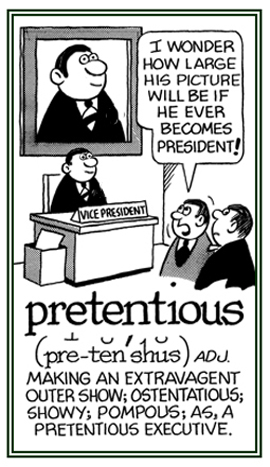
© ALL rights are reserved.

© ALL rights are reserved.
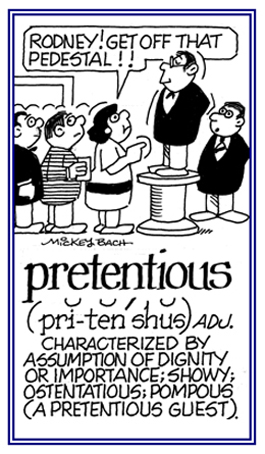
© ALL rights are reserved.
Go to this Word A Day Revisited Index
2. Relating to the unpleasant quality of a person who wants to be regarded as more impressive, successful, or more important than he or she really is: By using pretentious language, Jack expressed how easy the chemistry test was even though he did not have the highest grade after it was corrected by his teacher.
3. Etymology: from Latin pretentionem, "pretension"; from praetendere, "to pretend" from French prétentieux, "pretension."



Go to this Word A Day Revisited Index
so you can see more of Mickey Bach's cartoons.
preterite (adjective) (not comparable)
1. Regarding a verb tense expressing that something happened or was done at a determined moment in the past: In Susan's English class she learned that the preterite time in grammar was quite archaic and that it referred to the past, as in "Jane bought brown shoes yesterday", where "had" conveys a former time.
2. Etymology: from the 14th century, via Old French preterit from Latin praeteritum as in tempus praeteritum, "time past, time gone by" or "past time".
2. Etymology: from the 14th century, via Old French preterit from Latin praeteritum as in tempus praeteritum, "time past, time gone by" or "past time".
From the past participle of praeterire, "to pass over something"; from the late 16th century; Late Latin praeterition, "a passing by"; from Latin praeterire "to go by"; from prae-, "before" + itum, the past participle of ire, "to go".
The simple past tense in English grammar: Mrs. Jones told Grace that she should use the preterite instead of the present tense in the sentence in her essay.
The situation of letting something pass by; omission: Sam's mother overlooked the pretermission of the button on his jacket.
pretermit (verb), pretermits; pretermitted; pretermitting
1. To leave undone or to neglect: Jerome pretermitted his homework and so he was not prepared for the quiz in his mathematics class when he went to school in the morning.
2. To suspend or to break off: Tom's television was pretermitted as a result of the severe storm that took place in the evening.
3. To deliberately ignore or to pass unnoticed: Lina was pretermitting her sister when she was wearing a new dress as she was about to go on a date with her boyfriend.
4. Etymology: from Latin praetermittere, from praeter, "beyond" from prae-, "before" + mittere, "to let go".
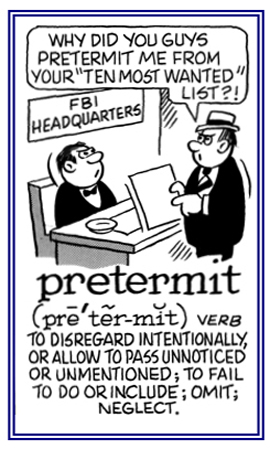
© ALL rights are reserved.
Go to this Word A Day Revisited Index
2. To suspend or to break off: Tom's television was pretermitted as a result of the severe storm that took place in the evening.
3. To deliberately ignore or to pass unnoticed: Lina was pretermitting her sister when she was wearing a new dress as she was about to go on a date with her boyfriend.
4. Etymology: from Latin praetermittere, from praeter, "beyond" from prae-, "before" + mittere, "to let go".

Go to this Word A Day Revisited Index
so you can see more of Mickey Bach's cartoons.
preternatural (adjective), more preternatural, most preternatural
1. Descriptive of something that is beyond what is normal, usual, or ordinary: Pamela was having preternatural dreams that made her wake up and have difficulty going back to sleep.
2. Etymology: from Latin praeternaturalis, "beyond nature" from prae-, "before" + naturam "nature, natural"

© ALL rights are reserved.

© ALL rights are reserved.
Go to this Word A Day Revisited Index
2. Etymology: from Latin praeternaturalis, "beyond nature" from prae-, "before" + naturam "nature, natural"


Go to this Word A Day Revisited Index
so you can see more of Mickey Bach's cartoons.
preternaturally (adverb), more preternaturally, most preternaturally
Describing how something or someone is very mysterious, mystic, miraculous, or ghostly; beyond what could be logical or normal: Celia was preternaturally gorgeous, and no other girl in school could match her beauty.
1. A misleading or untrue explanation given for doing something in an attempt to conceal the real reason: Sabina went back to her boyfriend's apartment with the pretext that she had forgotten her purse.
2. An effort or strategy intended to conceal something: Frank had a pretext that the heavy traffic kept him from getting to work on time, however it was really because he didn't get up in time.
3. Etymology: from Latin praetexere, "to disguise, to cover"; from prae-, "before" + texere, "to weave."
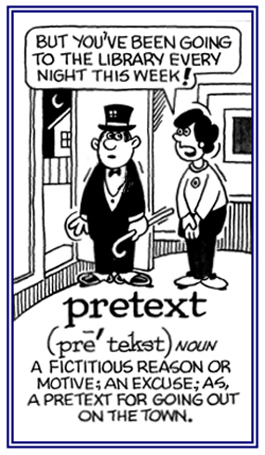
© ALL rights are reserved.
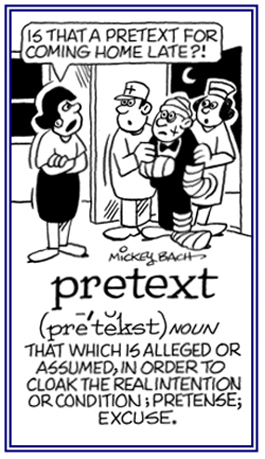
© ALL rights are reserved.
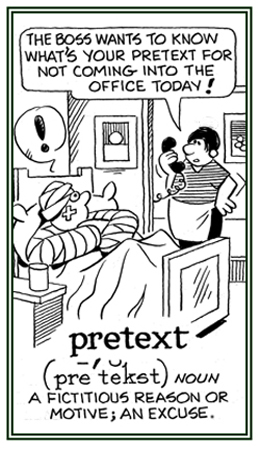
© ALL rights are reserved.
Go to this Word A Day Revisited Index
2. An effort or strategy intended to conceal something: Frank had a pretext that the heavy traffic kept him from getting to work on time, however it was really because he didn't get up in time.
3. Etymology: from Latin praetexere, "to disguise, to cover"; from prae-, "before" + texere, "to weave."



Go to this Word A Day Revisited Index
so you can see more of Mickey Bach's cartoons.
The syllable or vowel preceding the stressed or accented syllable; Examples of such pretones are shown by the following terms, and, in these cases, where the first letters are vowels: "electron", "atomic", and "adopt".
pretonic (adjective) (not comparable)
Referring to the unit in a word prior to the one which is stressed: Annette learned that the pretonic syllable in her name is "An", which appears before the rest of her name, which is the accented part.
prevail (verb), prevails; prevailed; prevailing
1. To be greater in influence or strength; to triumph: Virginia hopes that someday peace will prevail on earth and wars will be something of the past.
2. To be or become effecive; to win out: In making decisions in town, Jack thought that common sense and fairness would prevail.
3. To be in current usage; to persist: Some traditions and customs do prevail in many western countries, like Easter, Thanksgiving, and Christmas.
4. To persuade effectively and favorably: Nigel prevailed on his mother to let him go to the movies with his friends.
2. To be or become effecive; to win out: In making decisions in town, Jack thought that common sense and fairness would prevail.
3. To be in current usage; to persist: Some traditions and customs do prevail in many western countries, like Easter, Thanksgiving, and Christmas.
4. To persuade effectively and favorably: Nigel prevailed on his mother to let him go to the movies with his friends.
1. A huge amount or exceeding in numbers: Mr. Smart told his students that there was a prevalence of spelling mistakes in their tests which meant that they would have to spend much more time practising spelling!
2. The quality of predominance; widespread: There was a prevalence of buoyancy and hope among the students in the classroom when they heard that their last exam turned out to be very good!
3. The ratio of the number of incidents of an illness in a certain time period to a specific number of people in the population: The prevalence of the virus was greater in the southern countries than in the northern ones within Europe.
2. The quality of predominance; widespread: There was a prevalence of buoyancy and hope among the students in the classroom when they heard that their last exam turned out to be very good!
3. The ratio of the number of incidents of an illness in a certain time period to a specific number of people in the population: The prevalence of the virus was greater in the southern countries than in the northern ones within Europe.
prevalent (adjective); more prevalent, most prevalent
Referring to something which is common or most frequent: One type of criminal offence seemed to be quite prevalent at night in the town when the criminals stole expensive items from some cars parked in the side streets.
prevaricate (pri VAR i kayt") (verb), prevaricates; prevaricated; prevaricating
1. To be deliberately ambiguous or unclear in order to mislead or to withhold information: The local officials prevaricated about the real costs of the new city hall.
2. To avoid giving a direct and honest answer or opinion, or a clear and truthful account of a situation, especially by quibbling or being deliberately ambiguous or misleading: When anyone prevaricates, he or she is avoiding telling the truth or is not providing the real facts.
3. To stray from or to evade the truth; to equivocate: As a witness under oath, Bert didn't prevaricate but he answered all of the questions honestly.
4. Etymology: from Latin prevaricate, "to walk crookedly" from varus, "knock-kneed"; from this the verb varicare, "straddle" was combined with the prefix prae-, "before, beyond" which produced praevaricari, "to walk crookedly" or "to deviate from straightforward behavior" and "to turn away from the truth".

© ALL rights are reserved.
Go to this Word A Day Revisited Index
2. To avoid giving a direct and honest answer or opinion, or a clear and truthful account of a situation, especially by quibbling or being deliberately ambiguous or misleading: When anyone prevaricates, he or she is avoiding telling the truth or is not providing the real facts.
3. To stray from or to evade the truth; to equivocate: As a witness under oath, Bert didn't prevaricate but he answered all of the questions honestly.
4. Etymology: from Latin prevaricate, "to walk crookedly" from varus, "knock-kneed"; from this the verb varicare, "straddle" was combined with the prefix prae-, "before, beyond" which produced praevaricari, "to walk crookedly" or "to deviate from straightforward behavior" and "to turn away from the truth".

Go to this Word A Day Revisited Index
so you can see more of Mickey Bach's cartoons.
Related before-word units: ante-; antero-; anti-; pro-.
Related "time" units: aevum, evum; archaeo-, archeo-; Calendars; chrono-; horo-; Quotes: Time; tempo-.


